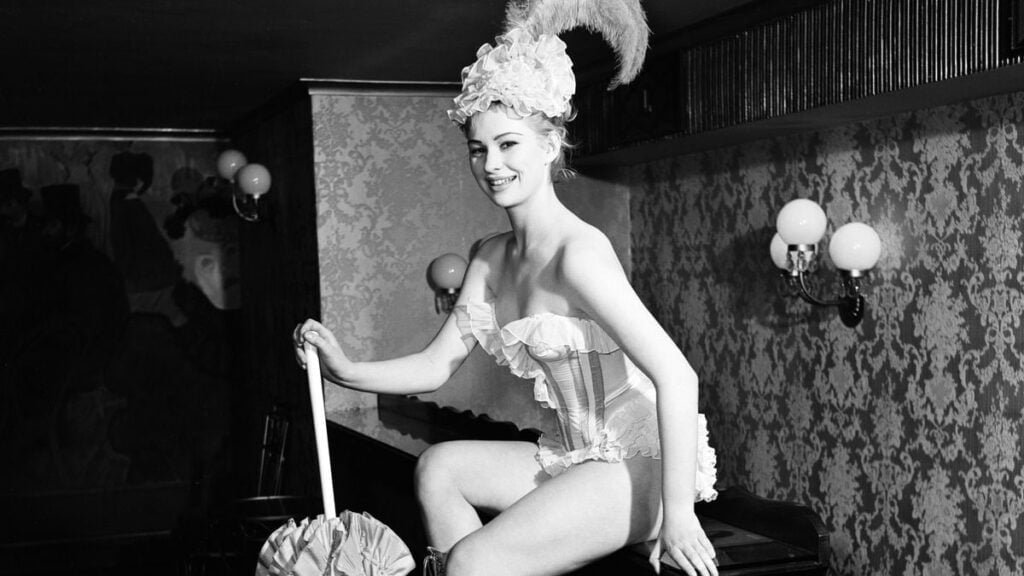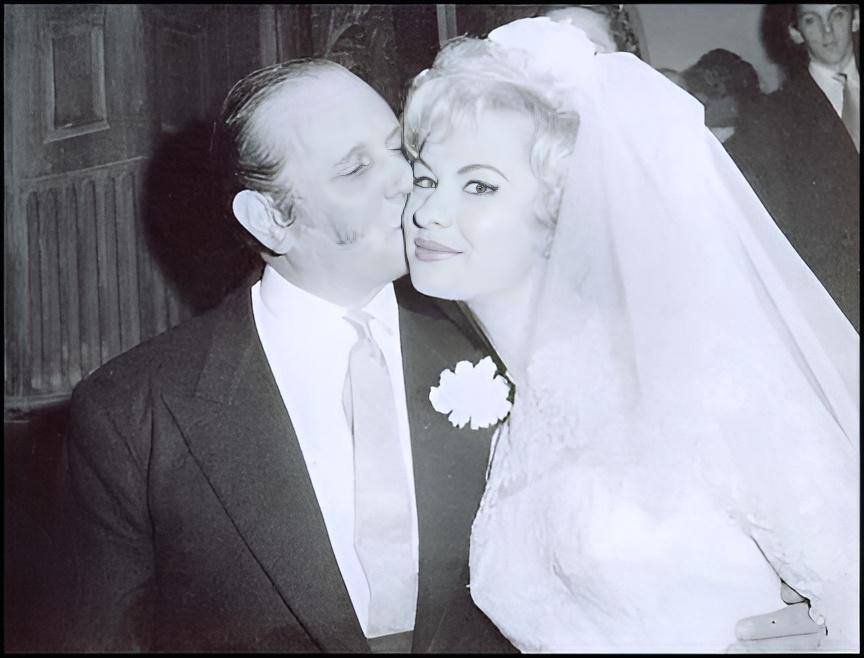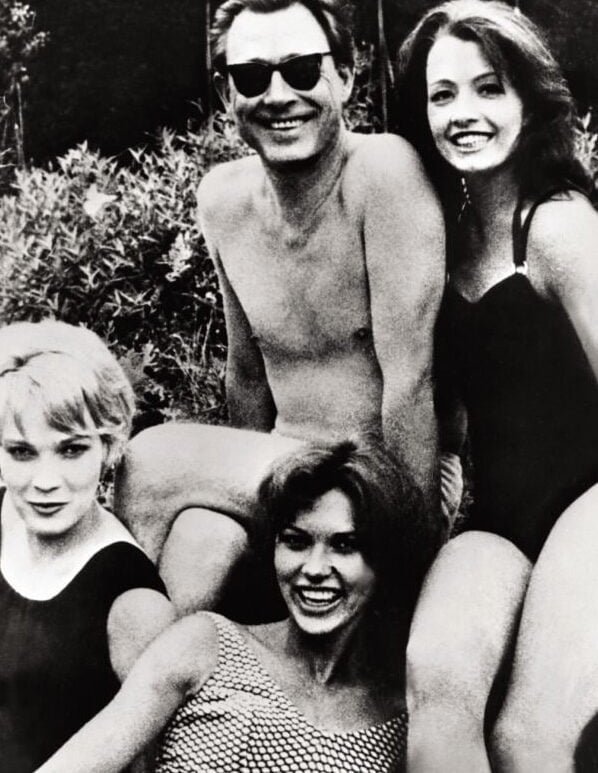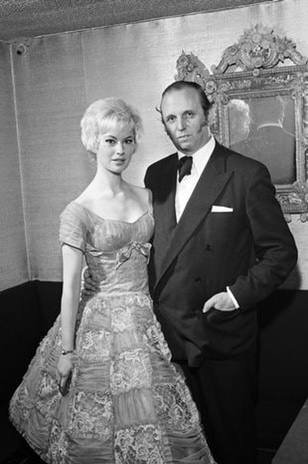At the height of the Cold War, in a country experiencing the final throes of a post-war economic boom, one strange man went on to play a central role in a scandal that brought down the British government. In a master class of how to get away with grand espionage, Hod Dibben coasted through danger seemingly without any fear. The night clubs of London, which have been the focus of our attention so far, are all under new ownership after a series of tragic deaths of their previous owners and hostesses. As always, with anything Horace Dibben did during this period, elite sex parties and sadomasochistic orgies were a key part of what would eventually develop into the Profumo Affair.
Constance Capes and the Mysterious Mr. Atherley
Stella Marie Capes was born on 9 May 1941 in Sheffield, Yorkshire, to an unmarried mother, Constance Capes. Although she was born Stella Marie Capes, the name she chose to use most often before she met Hod Dibben was Mariella Capes. To understand why “Mariella” Capes went by so many different names—including Mariella Novotny and Henrietta Chapman— it is worth revisiting a little-known anecdote concerning her mother, Constance Capes.
Mariella’s mother was born in Grimsby in 1903 and was involved in a very curious and well-documented case in 1927 concerning a man who had also used multiple identities. Constance was twenty-four-years-old when she went to work as a secretary for a fascinating fraudster named Mr. Reginald Winterburn Atherley. She was described in a Daily Mirror article dated 5 October 1927 as a “pretty North-country typist” with the article describing how she had “several strange experiences while she was acting as Mr. Atherley’s secretary at the Four Winds caravan in Thirsk.” Constance Capes described in her own words what occurred when she arrived in Thirsk after corresponding with Mr. Atherley:
“The salary he proposed was small, but he said he would give me shares in his business. I knew that Four Winds was a caravan, but I did not know it was his permanent head-quarters. After I had worked four days with Mr. Atherley at the Four Winds I felt compelled to leave.
In the first place, it seemed a little too much to expect a typist to work by day, and sometimes by night, in a caravan situated in a field far from town. When I had been at Four Winds two days a curious incident occurred which made me doubtful. It was on Sunday, September 18 when Mr. Atherley came to my lodgings and told me that he had seriously injured a man with his car. He urged me to return to the caravan, which I did. At the Four Winds he got me to type a letter to a woman in Southport stating that Mr. Winterburn was dying, and if she wished to send him a message it would be delivered to him on regaining consciousness.
I then received the amazing request to sign the letter as Mr. Winterburn’s private secretary. (I must explain that Mr. Atherley sometimes called himself Mr. Winterburn. On the Tuesday he astonished me by asking me to sign most of his letters for him. I told him that I could not put my name to some of his correspondence, and remarked that I thought I had better leave. In consequence of this I left his service the same day. Of course, I received no salary, but I was really glad to be away from Four Winds. Although I was in need of a job, I think I acted for the best in leaving, and I am sure every typist would have done the same.”
Constance Capes had had her first run-in with a conman at the Four Winds caravan and it garnered her a lot of attention. The curious case of Mr Winterburn Atherley and the Four Winds caravan received a lot of coverage in the Daily Mirror, so much so that Atherley complained to the newspaper via his solicitors that the reports about him were both libellous and defamatory. But it was not only a lone typist, Constance Capes, who was standing up for the truth, as there had been a number of fraudulent incidents involving the illusive Mr. Atherley, including with Captain Denis Ewart Bernard Kingston Shipwright, a former-MP who took it upon himself to confront the conman on a station platform, with the conversation being described as both “heated and futile.”

In response to Miss Capes recollections of her employment making the pages of one of the most popular newspapers at the time, Mr. Atherley’s solicitor sent her a demand, ordering her to return a notebook in which she had taken shorthand notes of Mr. Atherley’s business letters. Constance was lauded publicly for her response, with the plucky young lady stating:
“Re Note Book. I regret being unable to accede with your request, as the book referred to, containing Mr. Atherley’s note, is my property, a fact of which he is aware.”
Many other victims of Atherley’s fraudulent behaviour contacted the newspaper after they read the Winterburn/Atherley stories, giving their own experience of this conman. This level of publicity was probably something which a lowly typist such as Miss Capes enjoyed. In the same year that Constance exposed Reginald Winterburn as the fraudster he was, the audacious conman was sentenced on four charges including the assault of a lady named Beatrice Gray, impersonating the police, doing malicious damages to a police cell, and obtaining a driving licence after previously being disqualified. In court, Winterburn described himself as the “Mysterious Mr. Atherley, the super publicity agent” and when the magistrates were leaving to consider their verdict, he offered to read his life’s history to the court and even went on to sing a hymn for the baffled onlookers.
Did the extravagant real-life adventures of Reginald Winterburn inspire the daughter of Constance Capes towards a similar destiny? Not much else is known about Mariella’s mother, except that she never married and the fact that Christine Keeler, the wily central figure in the Profumo Affair, who was a friend of Mariella Capes, referred to Mariella’s mother as “a whore.” However, no evidence yet exists that Constance Capes engaged in such activity. Mariella was born two years into World War II and her mother was never married. Given the time period, that could have been enough for any lady to receive a negative reputation. Yet, Mariella herself would have no qualms about being involved in the sorts of activities which could lead to such name calling.
On 7 October 1940, Mariella’s mother is noted as “Miss Constance Capes” in the Daily Mail Newspaper while attending the wedding of her sister, Alice Capes. Roughly eight months later, Constance Capes gave birth to one of the most famous vixens of the 20th century. The next time Constance Capes was to be mentioned in the British press was in the Daily Telegraph on 6 June 1961. In that article, Constance and Hod Dibben are reported as meeting with Mariella as she arrived into Southampton on the Queen Mary after multiple intelligence agencies had coordinated to smuggle her out of the US.
The Hod Couple
By 1958, Mariella Capes was cast in the Folie Bergère London revue—a form of theatrical entertainment consisting of short sketches, songs, and dances—called Ah, Quelle Folie, at age 17. On 30 January 1958, it was announced in The Stage magazine that the French revue was heading for the West End. The Folies Bergère was a cabaret music hall which was located in the 9th Arrondissement in Paris. It had opened in 1869 and was famed for featuring raunchy nude cabaret, something which England in the late 1950s was still not quite ready for culturally speaking.

Jules Borkon who was representing the owners of the world rights of the official Folies Bergère announced that James Laurie was to present the show in London, with rehearsals were planned for March of 1958. Laurie would have to delay the production by a few months as he also had another curious international project to deal with first. In April 1958, it was reported in the Stage that:
“In July, Mr. Laurie is going to Australia to present his wife, Rosina Raisbeck, on a three-month concert tour and in the autumn he has plans for presenting an American opera star behind the Iron Curtain.”
By June, the revue of Ah, Quelle Folie, had begun receiving negative attention from one of the highest offices in the United Kingdom. The Daily News newspaper based in London reported that: “Changes have been ordered by the Lord Chamberlain’s office in the Folies Bergere revue, Ah, Quelle Folie, due to open tonight at the Winter Garden Theatre, Drury Lane.” The demand had come on the opening night of the show on 28 June 1958, and, if the necessary changes were not made, the show would not be allowed to continue. James Laurie would be quoted as saying: “We’ve made minor modifications mostly concerning the nudes.” One of those nudes was a very young Mariella Capes, who was still a minor. She was also to be used to advertise the raunchy cabaret, with a picture of her adorning page 2 of the Daily Mirror and an accompanying paragraph describing her “Edwardian strip-tease” and referring to Mariella Capes as “half-dressed in a coral pink negligee.”
By August 1958, the People newspaper was describing the Folies Bergère dancers as “Angry chorus girls” after James Laurie demanded that they commit to “pack drills” to improve their performances after the girls were found to be going to “so many parties and getting so little sleep that their dancing was suffering.” Just two months later, the Daily Herald was reporting on the flagging act under the headline: “Nude-show man denies close-down,” describing the act as costing £40,000 to produce and insisting that James Laurie denied that the show was closing, the reporter, Mike Nevard, states:
“Mr. Laurie is thinking about the girls. And if audiences don’t come up to scratch in the near future, girls like Mariella Capes will be trooping to the nearest employment bureau.”
The show was noted in the latter article as running for only four months before it flopped. Yet, Mariella Capes was hardly heading to an employment bureau in search of work. Instead, she was soon to wed none other than Hod Dibben, who would later make Mariella Capes one of the most famous women in the world.
In an article entitled “Club Boss To Wed Waitress”, the Sunday Mirror on 24 January 1960 continued with the bizarre plugging of the life and times of Horace Ronald Dibben. On this occasion, reporter Matt White was sent to find out about Horace Dibben’s new young lady-friend. After giving a brief recap of how Hod had previously made his former ward Patsy Morgan-Dibben into a charming young lady, White writes:
“Patsy Morgan-Dibben, the girl who was the subject of his first experiment and added his name to her own, left him three years ago – after he made her into the Hostess with the Mostest in London’s West End. Patsy’s Successor is blonde, Czech-born Mariella Capes. Dibben met her six weeks ago when he advertised for girls to work in his new Mayfair club, The Black Sheep.”
The story of how Hod and Mariella met is hard to take seriously and was likely told to the media in order to obfuscate the true nature of their first encounter. Per this narrative, Mariella had apparently gone for her job interview at the Black Sheep because she thought they needed dancers. She was soon to discover that they needed waitresses rather than dancers. However, the article goes on to state: “She was so short-sighted she was unable to see customers trying to attract her attention.” It was also reported that Hod’s business partner fired Mariella as a result, after which point she went weeping to Horace Dibben. Hod, being a “gentleman,” told her that he’d like to marry her. She had already said yes, but it is then reported that Dibben bought Mariella a pair of spectacles so she could see him properly. The article reads:
“She blinked at him, took in his mutton chop whiskers and said:- ‘I still love you. And I can’t wait till March. Let’s get married right away.’ So the date was brought forward to next Friday.”
The article only gets more tongue in cheek, with Hod Dibben being quoted as saying:
“By giving her those glasses, I’ve opened the world around her. Mariella will tour hairdressers and beauty salons until we find a hair-style and make-up which suits her best. She will be taught to sing – her voice is good, but needs training – and there will be lessons in deportment and fashion.”
A picture of Mariella Capes ran alongside the article, showing her biting the temple tip of her brand new spectacles. The Daily News in London reported the shotgun wedding of Mariella Capes and Horace Dibben on Saturday 30 January 1960, in a small piece entitled: “Bride of 18 moves into a mansion.” There it was reported that Horace Dibben had bought her a “40-room, sixteenth-century mansion near Pentworth, Sussex.” The previous article is also the first time in which Horace Dibben’s son from his first marriage is mentioned, stating: “By his previous marriage Mr. Dibben has a son who is 12 years older than his bride.” On the same day, the Daily Mirror also printed an article about the wedding which describes Mariella Capes as an: “Eighteen-year-old ex-Folies nude.”

This story of how the happy couple met may appear trite to us now, but it seemed to resonate with publications and readers around the world, with various articles about their romance appearing even in American local newspapers in places such as Arizona, Tennessee, and Indiana, to name a few. One article on 1 February 1960 in the Yuma Daily Sun and Arizona Sentinel stated that the couple had giggle fits at their wedding ceremony, with the article reporting on how the priest (referred to as “the preacher” in the American newspapers) warned them: “This is a serious occasion. You’ll have to leave if this doesn’t stop.” It was also said that Mariella, who was wearing a 200 year-old engagement ring given to her by Hod, was devastated when their spectacular multi-tiered wedding cake turned out to be stuffed with sawdust. It appeared that a lot of their wedding pomp was, in fact, just for show.
Ward, Dibben and Sugden – The Society Sexmen
Hod Dibben and Mariella Capes soon became a serious partnership, a force to be reckoned with, but it would be a friend of theirs who made their fetish sessions an enterprise with the power to take down a government. For many people, Stephen Ward, often referred to as the “society osteopath”, is remembered as the unlucky patsy in the “Profumo Affair”, an extremely well-documented sex scandal which resulted in the downfall of the British government.
Stephen Ward was the son of Canon Arthur Evelyn Ward who was, until his death in 1944, the Canon of Rochester Cathedral. Stephen Ward studied to become a doctor of osteopathy in America, attending the University of Minnesota. Yet, one of Dr. Stephen Ward’s many notable talents was sketching. During his lifetime of sketching, Ward would sketch portraits of the Duke of Edinburgh, Princess Marina, Lord Snowden, the Duke and Duchess of Kent and many others. Ward may have been close to Hod and Mariella and a definite sex addict, though he wasn’t a big fan of Dibben’s satanic-themed sex parties which were being held for London’s elite.

Horace Dibben was unconventional in almost every possible way, as was his relationship with Mariella Capes. They would also forge some very unconventional relationships after they were officially wed. In Douglas Thompson’s book, Stephen Ward: Scapegoat, Hod Dibben is mentioned on numerous occasions, with the author quoting a business partner of Hod’s, Mary Sykes, who stated:
“There wasn’t much not to like about Stephen [Ward] – he pursued his interests without any shame. As, of course, did Dr. Ward’s close friend Hod Dibben, who had three custom-made leather suits: two in black, one in faded red. He said the leather intensified the pleasure when he was caned or, preferably, birched. It was so pleasant he didn’t mind too much the chafing of the suits between his legs: ‘not so bad, if you use lots of talc – Johnson’s baby powder is best.’”
Thompson follows this rather revealing quote by writing:
“The pink-bottomed Dibben was the charming raconteur of White Horse Street. He spoke highly of the teenager he married at Caxton Hall on 29 January 1960: ‘She ties me to a chair in my leather suit, whips me and then makes me watch her screwing someone else.’ Exquisite excitement, he announced, adding: ‘I’m showering her with gifts – nothing is too good for this wonderful girl.’”
Thompson goes on to write:
“The only thing his bride (we’ll call her Mariella, for brevity) never got up close and intimate with was the truth about herself. Stella Capes, aka Mariella Capes, aka Maria Novotny, aka Henrietta Chapman is up there as a wonder of the world. She had a name for all seasons, a kink for all takers, an explanation for everything.”
The same book would also quote the renowned London gangster Bobby McKew and his experience with Mariella Capes, stating:
“‘The only thing that was consistent about Mariella,’ said Bobby McKew, who knew her well, ‘was that she wore her hat at all times – she never took it off. Once I was having a drink with this rather upper-class chap, who told me he was meeting his new girlfriend, Henrietta Chapman. Would I like to meet her? I thought nothing of it and went with him and there was Mariella. I said: “Hello, Mariella.” She smiles sweetly: “Oh, I’m so sorry. I’m Henrietta. You’re the third person this week to make that mistake – we must look very alike.” She was superb. She was sitting there smiling and wearing the hat she’d been wearing the night before when I saw her stark naked at an orgy. She was a one. She was certainly special – she was meant to be the President of some-where’s daughter but it was all bollocks, she was from Sheffield. But she turned everybody on, everybody upside down.”
For such a young lady, it seemed like it was second nature for Mariella to wrap very wealthy and powerful men around her little finger. The latter quote from Bobby McKew came with an anecdote of how she had once “put a needle through the window cleaner’s bollocks when he tried to fuck her,” also noting that the window cleaner was an “associate of the British Security Services” and had admitted that “he thought it was worth the risk.”
Douglas Thompson again quoted Bobby McKew in relation to the sex parties which Hod Dibben ran:
“‘He had a tough war, all these men in the skies did. That sort of thing makes you want to get on with life quickly – Hod just did it at double time. For a [Plymouth] Brethren boy, he certainly ran the most elaborate sex parties in London. You never knew who you might see there. Black magic and men in masks and peacocks wandering around were all at parties organised by Hod, not Stephen Ward. Stephen went to some of the parties but he wasn’t organising them. For many of us, it was curiosity. They were going on all over town but Hod’s were special, he had something for everybody.’”

Hod Dibben always had a keen eye on whatever was happening at his parties. Even when Gypsy Riley, the partner of infamous London gangster Billy Hill, went to the toilet at one of Hod’s gatherings, she was met with Hod’s eye’s watching her through spy-holes. Bobby McKew would later recant: “You couldn’t get up to anything without Hod seeing. Even having a pee.”
Stephen Ward and Hod Dibben became thick as thieves, so to speak, with the pair meeting up regularly in Knightsbridge and maintaining close connections with Dr. Teddy Sugden who, whereas Ward was known as the “society osteopath”, Sugden was the “society abortionist”. These three men were assisting the elites of London with everything from illicit hookups and sex gatherings, all the way to elaborate satanic-themed sex parties and secret abortions, they knew everyone’s secrets. Edward “Teddy” Charles Sugden was rumoured to perform 15 abortions a day during a time when abortions were illegal in Britain. For many of the gangland pimps, Teddy was a miracle worker, renowned for being able to abort a baby and get the girls back to work almost immediately. These three men had burrowed out a niche for themselves, Hod Dibben as the master of ceremonies, Stephen Ward as a high flying pimp, and Sugden as the clean-up crew for any unwanted pregancies. But none of these men could have gained any of this power if it wasn’t for the girls and long-queues of paying punters.
Sugden was another very strange character. He was said to have two distinguishing features; one being that half his face was paralysed which apparently left him looking as though he was always smiling; and the other was that he was sexually aroused by girls committing sex acts on reptiles. Mariella described him as a “150-guinea man” and Lillian Pizzichini claims in her book, The Novotny Papers, that:
“His illegal abortion clinic specialized in society ladies, actresses and whores pimped by gangsters who ran Soho. He guaranteed that he could get them back to work within the day.”
The latter book also claims that the night before her wedding to Hod Dibben, Sugden asked Mariella if he could watch while she simulated sex with a python. Although there are other witnesses to back-up the claim that Sugden had such serpentine peccadilloes, it is also clear for most researchers that Mariella told as many falsehoods as she told truths. For such a young lady, Mariella Capes had a lot of very strange associations and experiences. However, once she had married Hod, her experiences only became more profound, more protracted, and more Profumo.
The main reason why most of the characters in this series ended up dead or disappeared seems to be their common connection, the London night clubs that they were involved with or frequented. One thing was certain in London during the late-1950s, the gangland villains were taking over the town. Hod Dibben had moved his operation over to the Black Sheep and soon-after the Kray twins bought a stake in Esmeralda’s Barn. It was the first time that the gangsters of the East End of London had started to overtly move into the West End scene. In fact, you couldn’t own a club in London by the early 60’s if you weren’t paying protection money to one of the many organised racquets. The only group with enough power during this era to trump the gangland villains were the intelligence agencies, and they were about to play their hands and take control of the London scene.
As for Mariella Capes, she would eventually meet a very unusual and sad end, drowning in jelly, we’ll investigate that soon.











Great article! The interpretative character portrayals in the accompanying video were artistically robust. Rather enjoyable performance, really. *applauds* When performed in this manner (by Johnny), the apparent and inescapable conclusion is that Hod-the-odd-bod was a gargantuan narcissist with a Hindenburg-sized ego who just loved creating sensationalist drivel out of whole cloth. But out of every bad action comes some good. In this case, grist for Johnny’s comedic mill. 🙂